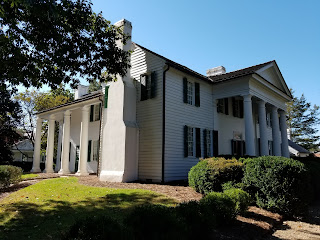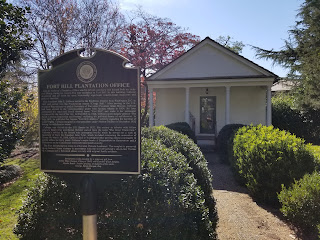Visited my alma mater Clemson University this past weekend and took the opportunity to walk around campus a little with my children. It was a beautiful time of the year to visit with the fall leaves about at their peak. I was aware of the historical home of John C. Calhoun being on campus and had seen it before but hadn't taken the opportunity to really look around the grounds. It is adjacent to the student union, actually on a hill with large trees around the antebellum mansion. The home is open for tours with hours each day of the week but unfortunately we caught it when it was closed. But the home has been beautifully maintained and has family furnishings throughout (which we were able to see a dining room and parlor thru a couple windows). On one side there is a reproduction of the original kitchen. The kitchen was kept apart from the main house to minimize fire risk and also to keep the heat out of the living quarters. The informational display for this kitchen indicated it was built in 1944 using materials from a nearby (Pendleton) plantation as the original structure had deteriorated to an extent it had to be torn down and removed. The same informational board provides some information about the slaves who had worked at Fort Hill including using the kitchen during the Christmas season, a valued blacksmith and, even performing a wedding ceremony there in 1849. At the back of the main house is the Fort Hill Plantation Office, Calhoun's personal office. An historical marker provides a short biography of Calhoun including his public service as a House Representative, Senator, Vice-President (under John Quincy Adams and Andrew Jackson) and also Secretary of War (under Monroe) and Secretary of State (under Tyler). In this office he is said to have written his political theories and discourses supporting states rights and the principle of nullification (The South Carolina Exposition and Protest). Calhoun's major books included " A Disquisition on Government" and "Discourse on the Constitution". Calhoun lived at Fort Hill for 25 years and the property is "preserved as an historic house museum in accordance with the will of Calhoun's son-in-law Thomas G. Clemson". After seeing Fort Hill we went for a walk in the South Carolina Botanical Garden on the Clemson campus. Some of the garden's camelias were in bloom and it was a wonderful walk in the brisk fall day. I took note of the Hunt Cabin which was moved to the garden site from Seneca. The modest abode belying the Hunts wealth as landowners of over 8000 acres. This home was built by their slaves in 1835 and so they would have been neighbors of Calhoun during this period of time.











No comments:
Post a Comment